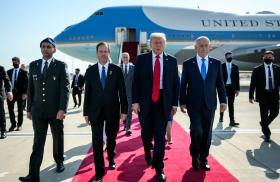What seemed at first to be the beginning of an orderly transition in Egypt is starting to look more like a war of attrition.
What seemed at first to be the beginning of an orderly transition in Egypt is starting to look more like a war of attrition.
As the worst outcomes in Egypt -- the violent suppression of demonstrations or anarchy -- seemed to recede as possibilities and a broadly inclusive negotiation between the main opposition camps and the government commenced, the relief from Washington was palpable. After all, the concessions offered by the Egyptian government -- the release of political detainees, a commitment to allow freedom of the press and refrain from blocking the Internet or mobile telephones, and the formation of committees to propose constitutional reforms aimed at allowing greater participation in the September presidential elections - would have seemed remarkable and most welcome just weeks ago. Furthermore, the government was taking actions which seemed to signal a break with the past -- in particular, the resignation of the deeply entrenched leadership of the ruling National Democratic Party.
But upon further inspection, the situation seems considerably less rosy. The opposition fundamentally mistrusts the government, suspecting that Vice President Omar Suleiman will renege on his pledges as soon as demonstrators leave Tahrir Square. They continue to demand not only the immediate resignation of Mubarak, but also perhaps of Suleiman and the entire parliament, as well as the suspension of the Constitution. Suleiman does little to allay such worries with his dismissive statements about the protestors, Mohammad ElBaradei, and democracy in general. So the throngs in Tahrir Square continue to swell, and Suleiman issues veiled threats against them.
Further complicating the picture is the likelihood that both sides are disunited. The opposition has coalesced around several broad goals, but secular groups are unnerved by the participation of the Muslim Brotherhood, and youth leaders who initiated the protests last month are wary of establishment business and political figures who now purport to speak for them. On the other side, the government is turning on its own, pursuing former cabinet ministers on corruption charges, and who precisely is in charge of the pro-Mubarak thugs who stormed Tahrir Square last week, or for that matter the military, is unclear. The Egyptian population appears solidly on the side of the demonstrators, but worried about the economic standstill and absence of tourists who by some accounts contribute ten percent of Egypt's GDP and one out of eight jobs there.
In the face of these complexities, historical analogies prove facile. Whatever lessons policymakers may draw from Iran in 1979 or other revolutions, such casual comparisons can be as misleading as they are instructive. Whether Iran in 2009, or Tunisia or Egypt in 2011, any unexpected turmoil is likely to catch Washington flat-footed, and the true test is how quickly amid the confusion the White House can forge a policy and a message that advances our values and our interests. In contrast to its perplexing response to the postelection protests in Iran in June 2009, in this case the White House eventually settled on the right goal -- free and fair elections leading to democracy. The trick is how to get from here to there.
The two chief worries among policymakers in Washington now are retrenchment by a regime reluctant to forgo its privileges, and of the imposition of religious rule by a radical minority on a relatively moderate majority. Averting both of these outcomes requires that Washington use its leverage and marshal that of its allies to push for real and irreversible changes which put Egypt unmistakably on a trajectory toward democracy.
First, the United States should present the generals, bureaucrats, and other elites around Mubarak with a sharp choice. Should they seek to rule through force or engineer an autocratic transfer of power, our friendship and assistance will be withdrawn. If, however, they work with the responsible opposition toward an orderly and democratic transition, then Egypt's alliance with Washington and the West will be strengthened. Egypt is not Iran or Syria; its prosperity is tied to good political and trade relations with the world, and its next generation of politicians and businessmen will be loath to sacrifice these ties.
In addition, the United States should push for quick steps that make clear a return to the old ways is no longer possible. The resignation of the NDP leadership was welcome in this regard, and the four steps outlined Tuesday by the White House -- ending the crackdown on civil society, immediately rescinding the emergency law, broadening participation in the transition talks, and working with the opposition on a roadmap and timetable for the transition -- should follow quickly. Each of these steps would represent a loosening of the regime's grip and the opening of political space, which are both essential if the next presidential election is to be truly competitive.
Finally, the United States, when the time is ripe, should support Egypt in quickly building a sound electoral process and the other institutions of democracy, and rally increased international financial aid toward this end. Egypt's leaders will need advice and technical assistance to ensure that an electoral system skewed to support the ruling party will not be skewed in the other direction to favor ideology over accountability and constituent advocacy. Egyptians rose up because they were frustrated by corruption and economic stagnation, and lacked the freedoms to address these frustrations via a political process. Any new political system must be responsive to those concerns and no mere vehicle for the Muslim Brotherhood and others to advance their agendas.
In the drama playing out in Cairo and across Egypt, each sundown has seemed to bring greater uncertainty, with some nights ringing out with jubilation, others with gunfire. Whether the Egypt to which we awaken is hostile or hospitable to U.S. interests depends on the choices we make, and those we press upon others.
Michael Singh is a visiting fellow at The Washington Institute and former senior director for Middle East affairs at the National Security Council.
ForeignPolicy.com



